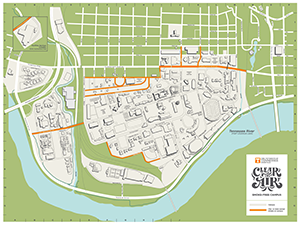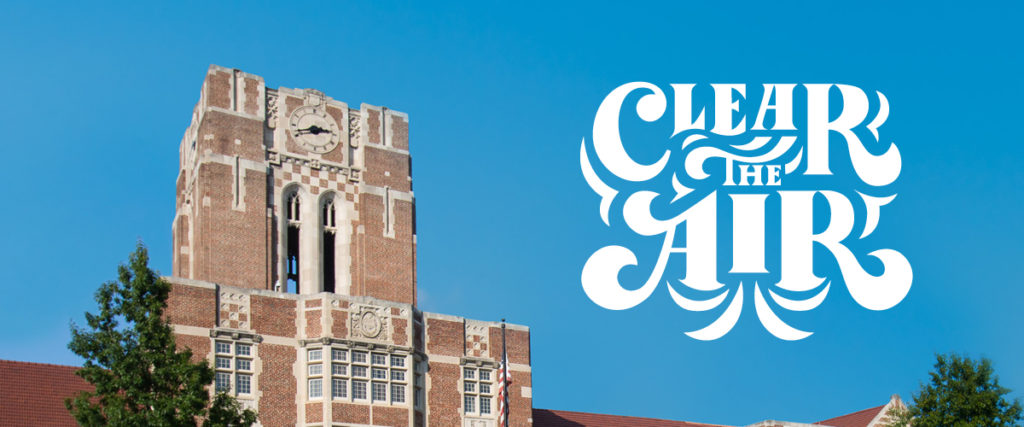What is the Smoke-Free Campus initiative? Why did UT decide to go smoke-free?
The Smoke-Free Campus initiative grew out of several years of widespread conversation and concern regarding smoking on campus. The initiative was specifically developed over time to address three concerns: protecting the health and safety of UT’s students, faculty, staff, and visitors; promoting a healthy and safe environment to learn, work, and live; and in compliance with state laws § 49-7-135 and § 39-17-1801.
![]()
Do other schools have similar policies?
More than 2,000 campuses across the US have adopted smoke- or tobacco-free policies. Within the SEC, UT’s transition to a smoke-free campus makes every school in the conference except one smoke- or tobacco-free.
![]()
What is included in the policy?
The policy prohibits the use of all combustible tobacco products—cigarettes, cigars, hookah, etc.—on campus, indoors and out. The use of electronic cigarettes—also known as e-cigs and vapes, among other names—are also prohibited.
![]()
Why did the university choose to go smoke-free instead of tobacco-free?
State law does not allow for designation of a tobacco-free campus (that is, banning smokeless tobacco use as well as smoking). In addition, smoking is the only form of tobacco use with the potential to harm others through secondhand exposure, making it a logical focus from a public health perspective.
![]()
Why are e-cigarettes included?
Like cigarettes, e-cigarettes expose others to airborne substances—and the potential health effects are not fully known.
![]()
What are the benefits of a smoke-free campus?
On an individual level, a smoke-free campus eliminates exposure to secondhand smoke, supports current smokers who are working to quit, and reduces smoking among those who still smoke.
Benefits that will accrue to the entire campus community include healthier students and employees, potentially resulting over time in lower insurance costs, and the elimination of ashtrays, which leading to a more attractive campus and giving the facilities staff more time and resources to focus on other needs. Fostering a progressive campus environment will help us recruit and retain top students, faculty, and staff.
![]()
Do these policies really make a difference?
A comprehensive study conducted at the University of Minnesota indicates that establishing a smoke- or tobacco-free campus decreases tobacco use among students and employees and lowers students’ acceptance of tobacco use, among other positive effects.
![]()
How is the policy enforced?
For the most part, the policy will rely on voluntary compliance. Creating a positive and supportive smoke-free environment is a responsibility that we all share. All members of the campus community are encouraged to promote compliance in a spirit of thoughtfulness, consideration, and cooperation.
While the emphasis is on education and support rather than penalties, violations are subject to disciplinary action as with any university policy. Faculty and staff can discuss concerns about violations with their immediate supervisor; students can bring their concerns to the Office of Student Conduct and Community Standards.
![]()
Is the university requiring that people quit smoking?
No, although all members of the university community are encouraged to consider quitting.
![]()
What areas of campus will the smoke-free campus policy cover?
 The policy covers all campus buildings and all outdoor spaces with the exception of sidewalks owned and maintained by the city of Knoxville. Click on the map for details.
The policy covers all campus buildings and all outdoor spaces with the exception of sidewalks owned and maintained by the city of Knoxville. Click on the map for details.
![]()
Can I smoke in my vehicle?
The policy prohibits smoking in private vehicles when parked or operated on university property.
![]()
Why are there no designated smoking areas?
The experience of other universities indicates that the benefits of a smoke- or tobacco-free campus are considerably lessened when smoking areas are designated.
![]()
What about athletic and cultural events held on campus?
The policy extends to all locations on the UT campus 24 hours a day, seven days a week.
![]()
I’d like to quit smoking. What resources are available to me?
